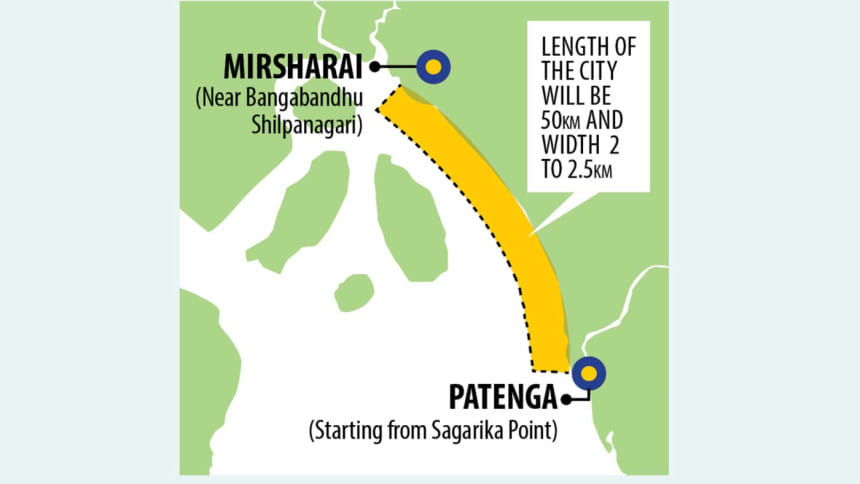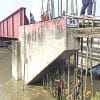Offshore Smart City: Can a parliamentary committee recommend a project to PM without due diligence?

Can a parliamentary standing committee recommend a project directly to the prime minister without any due diligence? The law explicitly does not permit it.
But that is what the parliamentary standing committee on housing and public works ministry has done recently -- in an instance not witnessed in the recent history of the parliament, according to parliament secretariat officials.
"It's a very good proposal and Bangladesh will surely benefit -- I will write to the prime minister requesting her to accept it,"
The committee recommended the proposal of a smart city on the Bay of Bengal from a consortium of two local and two Chinese companies to the prime minister without consulting with the law ministry, the foreign ministry or any of the national security agencies. There was no environmental impact assessment (EIA), either.
Coincidentally, the chief of the parliamentary body, who is the Chattogram-1 Awami League MP Mosharraf Hossain, and his family own about 42 percent stakes in one of the companies of the consortium: The Peninsula Chittagong.
His son Mahboob-Ur-Rahman is the chairman of the company incorporated in 2002.
Also on the board are Hossain's wife, Ayesha Sultana, and her brothers Mustafa Tahir Arshad and Mustafa Tahseen Arshad, who is the managing director of the company; his wife Bilkis Arshad is a director, too.
The other companies in the consortium are China Civil Engineering Construction Corporation (CCECC), China Railway Design Corporation (CRDC) -- both big beneficiaries of construction projects financed with Chinese development loans abroad -- and Mazumder Enterprise, The Daily Star has learnt from people involved with the project.
It is not known what would be the share of the four companies in the joint venture company.
CCECC is working on several development projects in Bangladesh, including the expansion of Cox's Bazar Airport and the construction of Chattogram-Cox's Bazar rail link.
The company last year had expressed an interest to implement the Bangladesh Railway's proposed high-speed rail line project on the Dhaka-Chattogram corridor.
But it was CRDC along with Mazumder Enterprise that ended up carrying out the feasibility study and detail designing for the project, which has now gone on the back burner.
Established in 1998, Mazumder Enterprise is an integrated consulting, engineering and contracting services firm. Its Chief Executive Officer Mohammed Jashim Uddin Chowdhury is a member of AL's sub-committee on relief and social welfare since 2014, according to his Facebook page.
The consortium of four is lobbying for reclaiming about 60 square kilometres of land from the sea and developing a smart city, according to a document presented at the parliamentary standing committee's meeting on February 22.
The Daily Star has a copy of the document, which does not contain enough details to warrant recommending the proposal straight to the prime minister.
Starting from the Sagarika Point of the Patenga Beach, the smart city will stretch up to Bangabandhu Shilpa Nagar in Mirsarai -- redrawing the map of Bangladesh.
It was not part of any long-term plan of the government until January 9, 2019, when the proposal was made to the Chattogram Development Authority (CDA).
In exchange for a share of the proceeds from the sales of the structures in the islet, the consortium would build a 20.5-kilometre metro rail line connecting the port city's train station and the airport costing $2.2 billion for free -- a rare offer that indeed sounds too good to be true and raises a plethora of questions.
The document does not specify which would come first: the metro rail or the smart city.
CDA -- whose jurisdiction is on 1,152 square kilometres of the Chittagong Metropolitan Area, with its boundary on the west ending at the Bay of Bengal -- is fully on board with the unusual plan.
Section 6 of the Chattogram Development Authority Act-2018 outlines the power and function of CDA and it does not mention anything about the sea but about the existing land mass of the country.
This raises the question of whether the CDA went beyond its limits when it sent the proposal to the ministry of housing and public works for placing before the parliamentary standing committee.
That was done at the meeting on February 22, where the committee endorsed it, in a move that walks a tight rope on the parliamentary body's mandate.
As per article 76 (1) of the constitution, a parliamentary standing committee is supposed to examine draft bills and other legislative proposals, review the enforcement of laws and propose measures for such enforcement.
The committee will also investigate or inquire into the activities or administration of the ministry under its jurisdiction and perform any other function assigned to it by the parliament.
But the section 248 of the rules of procedure of the parliament states the committee can "examine, if it deems fit, any such other matter as may fall within its jurisdiction and to make recommendations".
It is this grey area that the committee appears to have leveraged to recommend the proposal, which, according to Hossain, was not vetted by the law ministry, the foreign ministry or any of the security agencies and did not have an EIA.
The consortium's offer to build the metro has thrown a curveball to the road transport and bridges ministry, which is in advanced talks with the Korea International Cooperation Agency for conducting a feasibility study for establishing a mass rapid transit network in the port city, according to ministry officials.
Besides, the building of metro rail or public transport facilities falls under the jurisdiction of the road transport and highway division, which raises the question of the CDA's involvement of any kind in the port city's mass rapid transit network plan.
"It's a very good proposal and Bangladesh will surely benefit -- I will write to the prime minister requesting her to accept it," Hossain told The Daily Star recently.
When prodded on his family's involvement in the project, he said: "It's not my family but The Peninsula Chittagong, a public limited company, that came on board as a partner."
Hossain, who previously helmed the ministries of civil aviation and tourism and housing and public works in two separate terms, said his holdings in the company, which was listed with both the bourses in 2014, are less than 5 percent.
The shareholding position report submitted by the company to the Dhaka Stock Exchange -- and is available on the company's website -- indicates otherwise: he had 7.44 percent stakes in The Peninsula Chittagong at the end of March.
Not just that, most of the shares of the company, which operates an upscale hotel in the port city since 2006, belong to Hossain and his family.
As on March 31, Hossain and his family members' holdings in the company were 42.8 percent: Rahman (3.1 percent), his wife Mirka (2.57 percent), Sultana (5.05 percent), Mustafa Tahseen Arshad (12.32 percent), his wife Bilkis (7.7 percent) and his brother (4.62 percent).
"Most of the shares belong to the general public. Several lakh shareholders of this public limited company are involved with this project," he added.
As on March 31, the general public held 34.01 percent stakes in the company, institutional investors -- including the state-owned Investment Corporation of Bangladesh -- 15.96 percent and foreign investors 0.2 percent, according to the DSE.
Discussion on a project in a parliamentary body whose chief has involvement in it is tantamount to conflict of interest, said Nizam Ahmed, an expert on parliamentary affairs.
"Although it is not unlawful from the legal side, it is unethical from the point of ethics," said Ahmed, a former professor of the University of Chittagong's department of public administration.
Hossain though remained defiant.
"Those who are finding a conflict of interest are misinterpreting the situation. We are a land-hungry country. We will not get land from either India or Myanmar. We will have to manage by reclaiming land from the sea. Why should I not accept this when I don't have money and when I am getting an MRT for free?"
His son Rahman though was circumspect about the proposal.
"We have forged a partnership with two Chinese companies mainly to see whether the project is feasible or not. We are working as a sales, marketing and promotion partner," he told The Daily Star recently.
The Peninsula Chittagong would invest in the project if it is found to be viable.
"We are assessing the market. It is a strategic partnership for us as we already operate hotels in this part of the country," said Rahman, who is also the managing director of Sayeman Beach Resort in Cox's Bazar.
The feasibility study for the project is "almost done", he said.
Asked about the Chinese companies' role in the project, he said: "They will work as a developer -- they will get proceeds from the sales of structures and services."
The area selected for development is a dead end of the sea and it is not the main channel, according to Kazi Hasan Bin Shams, the chief engineer of CDA.
"The width would be 2 to 2.5 km and the length around 50 km. The depth of the sea in this area is not that much."
The reclaimed land would belong to the land ministry but it would be handed over to the CDA, which would then develop it with the consortium.
The consortium will build the metro rail as it is imperative to make the smart city viable, Shams said.
"China will provide the money but we will be the owner of the smart city," he said, adding that the reclamation was not part of the CDA's master plan.
The CDA's master plan is now being reworked to accommodate the smart city, which would be close to the Bay Terminal.
When quizzed whether the sea falls under the jurisdiction of the CDA or whether it has any mandate for projects offshore, he was elusive.
"Any project in the Chattogram area -- be it public or private -- requires the CDA's permission. This is why they have sent the proposal to us."
The document presented to the parliamentary standing committee meeting mentions a memorandum of understanding has been signed between the CDA and the consortium on January 3.
But Shams denies any such agreement. "That will be done once the government gives the go-ahead."
He also denies that the feasibility study for the project has begun. "For that, they will need the government's permission."
Once the consortium gets the permission for a detailed feasibility study, the CDA will negotiate the share of the sales proceeds, Shams added.
Asked whether the opinion from the law ministry was taken before forwarding the proposal to the ministry of housing and public works, a CDA official involved with the proceedings responded in the negative.
"We will take legal opinion, if needed, once the project gets the go-ahead," he said wishing not to be named.
Artificial islands or extensions are allowed under international law as they do not create additional territorial jurisdiction over the seas, according to a Supreme Court lawyer consulted by The Daily Star.
"There is no geopolitical issue here -- we will reclaim lands from our sea," Hossain said, adding that India and Myanmar should have no objection as the proposed development would not be in the vicinity of the two countries.
He is also certain that the smart city will have no adverse effect on the ecosystem.
"Cities and big structures are being built through reclaiming lands from the sea everywhere in the world. There has been no damage to the environment," said the 79-year-old presidium member of the AL, adding that the EIA will be conducted once the final agreement is signed.
The prime minister is yet to take a call on the proposal, Shams told The Daily Star last week.
The government should carry out two types of comprehensive studies before taking on such a big project, said Sharif Jamil, general secretary of Bangladesh Poribesh Andolon, an environmental platform.
One is the EIA itself and the other is a strategic environmental assessment, which is imperative.
Pointing to the spree of ongoing development activities in Matarbari and Cox's Bazar, he said: "There was no study on cumulative impact assessment before carrying out those development activities. Now we see the erosion of the Cox's Bazar beach."
Iftekharuzzaman, executive director of Transparency International Bangladesh, called for greater scrutiny of the proposal due to the conflict of interest and for ensuring an equal footing if there is any deal.
The Daily Star contacted the Chinese embassy in Dhaka and an embassy staff replied saying: "Sorry I don't know too much about this project. I checked but I don't have too much information."
Mazumder Enterprise declined to comment for the report. The Daily Star could not reach CCECC and CRDC.


 For all latest news, follow The Daily Star's Google News channel.
For all latest news, follow The Daily Star's Google News channel. 








Comments